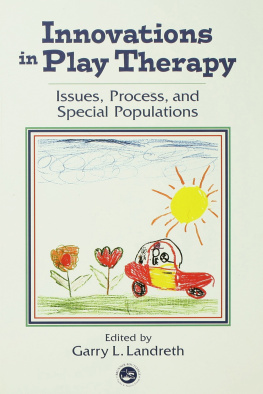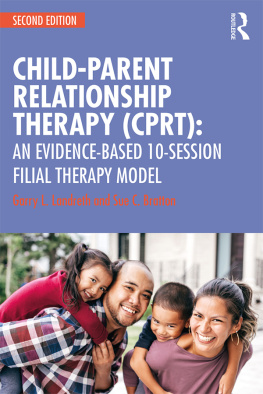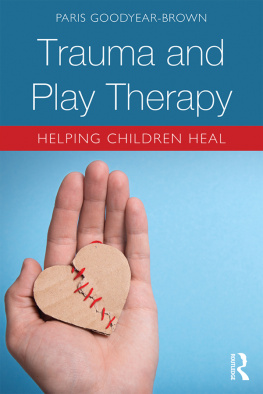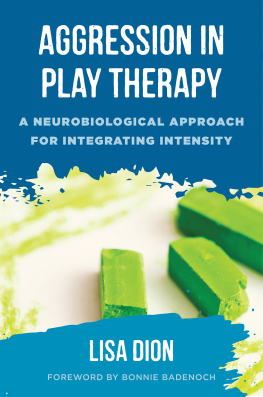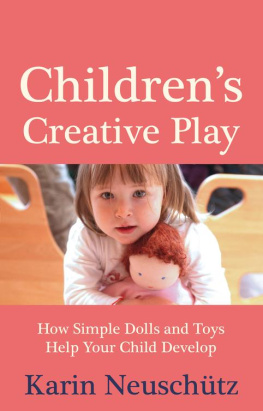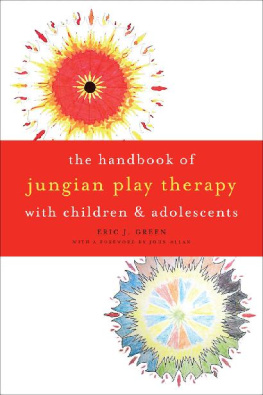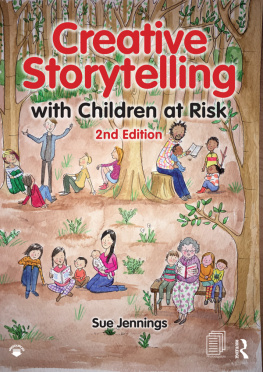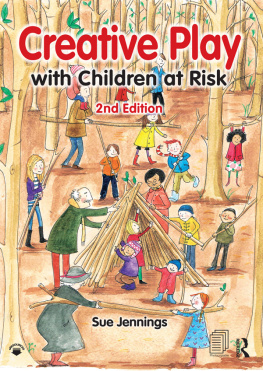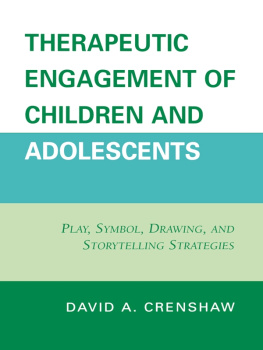
INNOVATIONS IN PLAY THERAPY
INNOVATIONS IN PLAY THERAPY
Issues, Process, and Special Populations
edited by Garry L. Landreth

Published by Brunner-Routledge 29 West 35th Street New York, NY 10001 |
UK | BRUNNER-ROUTLEDGE A member of the Taylor & Francis Group 27 Church Road Hove E. Sussex, BN3 2FA Tel: +44 (0) 1273 207411 Fax: +44 (0) 1273 205612 |
INNOVATIONS IN PLAY THERAPY: Issues, Process, and Special Populations
Copyright 2001 Taylor & Francis. All rights reserved. Printed in the United States of America. Except as permitted under the United States Copyright Act of 1976, no part of this publication may be reproduced or distributed in any form or by any means, or stored in a database or retrieval system, without the prior written permission of the publisher.
4 5 6 7 8 9 0
A CIP catalog record for this book is available from the British Library.
The paper in this publication meets the requirements of the ANSI Standard Z39.48-1984 (Permanence of Paper)
Library of Congress Cataloging-in-Publication Data
Available from the publisher
ISBN: 1-56032-881-9 (paper)
DOI: 10.4324/9780203768440
About the Editor

Garry L. Landreth, Ed.D., LPC, RPT-S., internationally known for his writings and work in promoting the development of play therapy, is a Regents Professor in the Counselor Education Department at the University of North Texas. He is the founder and director of the Center for Play Therapy, the largest play therapy training program in the world, and has conducted workshops focusing on play therapy throughout the United States and in Canada, Europe, China, South Afirca, and South Korea.
Dr. Landreths more than 100 publications and videos include three books on group counseling and seven books on play therapy. His award winning book Play Therapy: The Art of the Relationship has been translated into Chinese, Russian, and Korean. Dr. Landreth is a licensed professional counselor, licensed psychologist, founding member of the Board of Directors of the Association for Play Therapy, and a registered play therapy supervisor. He has been the recipient of numous professional honors and awards, and he is a frequent featured speaker at national and state conferences.
Contributors
Meredith K. Ater
M. Ed., is a Child Therapist for Family Service Inc. in Fort Worth, Texas.
Patricia A. Chuck
M. Ed., is a Child Therapist for Focus on Youth in Cincinnati, Ohio.
Jodi Crane
M.A., is Assistant Professor of Counseling in the Department of Human Services for Lindsey Wilson College in Columbia, Kentucky.
Kay Draper
Ph.D., LPC., is Assistant Professor in the Department of Counseling and Psychological Services at Georgia State University in Atlanta, Georgia.
Geraldine J. Glover
Ph.D., LPCC, RPT-S., is a private practice Play Therapist in Santa Fe, New Mexico and Adjunct Professor at the College of Santa Fe in Santa Fe, New Mexico.
Tina Edling Harris
M.Ed., is a counselor at Bradfield Elementary School in Garland, Texas.
Pat Ledyard Haynes
M.Ed., is an Academic Mentor for the Education and Health Science Department at the University of Arkansas in Fayetteville, Arkansas.
Shirley Hendricks
Ed.D., is a Professor Emeritus in the Department of Counseling at Southwest Missouri State University in Springfield, Missouri.
Linda E. Homeyer
Ph.D., LPC, RPT-S., is an Assistant Professor in the Department of Educational Administration and Psychological Services at Southwest Texas State University in San Marcos, Texas.
Shaunda Peterson Johnson
M.Ed., LPC, RPT., is a Treatment Specialist for the Arrow Project in Porter, Texas.
Elizabeth Murphy Jones
Ph.D., is a private practice Play Therapist in Fort Worth, Texas and Adjunct Professor at the University of North Texas in Denton, Texas.
Nancy Pittard Jones
Ed.S., RPT., is a School Counselor for the Gwinnett County Schools in Tucker, Georgia.
Shu-Chen Kao
Ph.D. is an Assistant Professor in the Department of Guidance and Counseling at the National Chang-Hua University of Education in Chang-Hua, Taiwan.
Jeffrey W. Klein
M.Ed., LPC, is a therapist for the Austin-Travis County MHMR Partial Hospital Program in Austin, Texas.
Ashley Tyndall-Lind
Ph.D., LPC-S, RPT-S, NCC, is the Director of Clinical and Professional Services at the Genesis Womens Shelter in Dallas, Texas and Adjunct Professor at the University of North Texas in Denton, Texas.
Wynne Mittledorf
M.Ed., LPC., is Care Manager at Magellan Behavioral Health in Dallas, Texas.
Brenda Niel
M.Ed., RPT., is a private practice play therapist in Chattanooga, Tennessee.
Lessie Perry
Ph.D., LPC, RPT-S., is a private practice play therapist in Denton, Texas and Adjunct Professor at the University of North Texas in Denton, Texas.
Phyllis Post
Ph.D., LPC, NCC, NCSC., is a Professor in the Department of Counseling, Special Education, and Child Development at the University of North Carolina at Charlotte in Charlotte, North Carolina.
Daniel S. Sweeney
Ph.D., LPC, MFCC, RPT-S., is an Assistant Professor in the Counseling Department at George Fox University in Portland, Oregon.
Ross J. Tatum
M.D., is a Child Psychiatrist in private practice in Fort Worth, Texas.
Pamela Webb
M.Ed., LPC, LMFT., is a Special Education Counselor for the Austin Independent School District in Austin, Texas.
JoAnna White
Ed.D., LPC, RPT-S., is a Professor in the Department of Counseling and Psychological Services at Georgia State University in Atlanta, Georgia.
Preface
Although there are many other play therapy texts, the topics and issues dealt with in this text are unique. The objective is to bring together essential information related to important issues, dynamics of the process, and special populations in play therapy. The specific dimensions of play that contribute to the therapeutic process of play therapy are explained and cultural issues which need to be considered in working with different populations of children are discussed with some suggested modifications in the typical play therapy approach. Play therapists are seeing increasing numbers of children who have been placed on various medications. Therefore, a chapter is included to help play therapists to become more conversant with psychopharmacological issues related to children.
Play therapists are constantly confronted with legal and ethical issues beginning with the arrangements necessary to initiate therapy with a child. An initial concern, also, involves issues related to working with parents and how to utilize parents in the helping process. Therefore, these dimensions are presented in an overview format to help the play therapist focus on essential considerations.
The difficult dimension of diagnosis is made clear through specific descriptions of how the play therapist can use play behaviors to diagnose physical abuse, sexual abuse, and emotional maladjustment in children. Common play themes of abused children are presented to help the play therapist identify such problems and a new scale for determining sexual abuse is described. In the play therapy process, it is essential that play therapists recognize and understand common patterns of play, types of play behaviors, and typical themes that emerge during play therapy with abused children.
Next page
